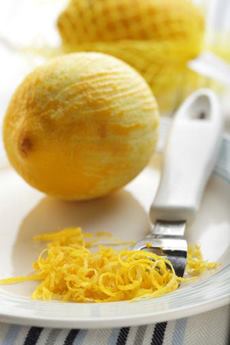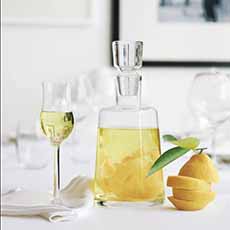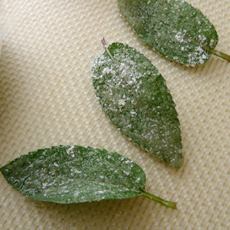Lemon Cream Pie Recipe For National Lemon Cream Pie Day
|
|
It’s November 29th: National Lemon Cream Pie Day. What’s the difference between cream and creme? See the explanation below (we prefer cream).
We adapted this classic lemon cream pie recipe from one of our favorite bakers, Audra, The Baker Chick (who adapted it from Martha Stewart). We have two less classic recipes for your consideration: The recipe follows, but elsewhere on The Nibble you might like: > The different types of pie: a photo glossary. > The history of pie à la mode. > The different types of lemons: a photo glossary. > The year’s 14 lemon holidays. Ingredients For 1 Nine-Inch Pie *The gelatin stabilizes the whipped cream topping, so it doesn’t collapse after a few hours. If you plan to serve the pie immediately, you can skip this step. |
|
 [6] Here’s another lemon cream pie recipe, with a surprise ingredient: limoncello liqueur. Here’s the recipe (photo © Taste Of Home). Preparation 1. PREHEAT the oven to 425°F. Roll out the crust and drape it over a 9-inch pie dish, trimming and crimping the sides. Prick the bottom of the crust with a fork and place it in the freezer while the oven preheats. 2. LINE the chilled crust with foil and cover with pie weights or dried beans. Bake the crust for about 20 minutes, or until the edges are set. Remove the foil and bake another 5-10 minutes. If the crust puffs up, just flatten it with a fork. Remove the crust from the oven and reduce the heat to 350°F. 3. MAKE the filling. Whisk together the eggs, lemon juice, sour cream, salt, sugar, and zest. Pour into the crust and carefully place back into the oven. Bake for 25-35 minutes, or until the edges of the pie are completely set, with the inside still a bit jiggly. Let cool completely before proceeding. If you’re in a hurry, you can place the pie in the freezer. 4. MAKE the topping. If using the gelatin, dissolve it in cold water and then place it in a saucepan over low heat, stirring until dissolved. Let cool slightly. 5. WHIP the cream and sugar with a whisk attachment until soft peaks form. Add the liquid gelatin and continue to whisk until you have medium peaks. Spread whipped cream onto cooled pie and serve chilled. If using the mint leaves, add just before serving. |
||
|
RECIPE #2: CANDIED MINT LEAVES
Also called crystallized mint leaves, crystal mint leaves, and sugared mint leaves, we know that President Lincoln and his wife Mary enjoyed them on cakes, in salads, and as sweetmeats, along with candied flower petals. You can candy basil leaves edible flowers with the same recipe. Just be sure they flowers are organic—no pesticides. Use them to garnish beverages and desserts, including ice cream. The candied leaves must be made 24 hours in advance so they can dry. If you can find a specialty mint—apple mint, chocolate mint, lemon bergamot or orange bergamot mint—so much the better! ________________ †You can pulse table sugar in a food processor or spice grinder to make it superfine. 1. SELECT 12 attractive mint leaves of similar size (unless you want a range of sizes). Remove them from the stalk, keeping the stems with the leaves. Rinse in cool water and gently pat dry with a paper towel. 2. BEAT the egg white until frothy. If concerned about raw egg whites, use pasteurized egg whites like Davidson’s Safest Choice. |
|
|
|
3. BRUSH a thin layer of egg onto the mint leaves, evenly coating both sides so the sugar sticks evenly. If the mixture is too runny, let it sit a minute before proceeding. 4. TRANSFER the leaves onto a parchment-lined baking sheet, leaving enough space between them so they don’t stick together. Let them dry for 24 hours, uncovered. 5. STORE the leaves in an airtight container if not using immediately. If you don’t like the look of the stems, trim them before garnishing (the serve as a convenient handle until then). What’s the difference between creme and cream? Why are some pies called “creme pie” and others “creme pie?” The answer: ignorance that became an accepted spelling (but not accepted by us!). Crème, pronounced KREHM, is the French word for cream. In America, French recipes were served at the tables of the wealthy, most of whom knew how to write and pronounce French properly. As these recipes entered the mainstream, people who did not know French began to pronounce crème (KREHM) as (KREEM), and dispensed with the accent mark: hence, creme. This mashup of French and English became acceptable, and over time, “creme” was used for American dishes like cream pie, because “creme” looked fancier (i.e., French-associated was better). To display your erudition when discussing a French dish, e.g. Crème Brûlée, use crème; when discussing an American dish, e.g. Chocolate Cream Pie, use cream. CHECK OUT WHAT’S HAPPENING ON OUR HOME PAGE, THENIBBLE.COM. |
||






